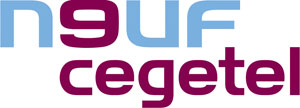Telecommunications in Peru include radio and television, fixed and mobile telephones, and the Internet.

Telefónica, S.A. is a Spanish multinational telecommunications company headquartered in Madrid, Spain. It is one of the largest telephone operators and mobile network providers in the world. It provides fixed and mobile telephony, broadband, and subscription television, operating in Europe and the Americas.
Telecommunications in Cuba consists mainly of NTSC analog television, analog radio, telephony, AMPS, D-AMPS, and GSM mobile telephony, and the Internet. Telephone service is provided through ETECSA, mobile telephone service is provided through the Cellular Telephone Company of Cuba (CUBACEL) and, previously, Caribbean Cellular. Cuba's main international telecommunications links are through Intersputnik, with limited effectiveness of undersea telephone cables to the Americas, Spain, and possibly Italy due to underdevelopment.

Hellenic Telecommunications Organisation S.A. is the largest technology company in Greece. It is one of the three largest companies listed in the Athens Stock Exchange, according to market capitalization.

Vodafone Group Plc is a British multinational telecommunications company. Its registered office and global headquarters are in Newbury, Berkshire, England. It predominantly operates services in Asia, Africa, Europe, and Oceania.

TIM S.p.A. is an Italian telecommunications company with headquarters in Rome, Milan, and Naples, which provides fixed telephony and DSL data services.

Empresa de Telecomunicaciones de Cuba S.A. is the Cuban state company that provides telephony and communications services in Cuba. It is the sole lawful provider of telephony and telecommunications permitted by the Cuban penal code, constituting a communications state monopoly that has 8 million clients, both national and foreign.
Innovate Corp. is an American public financial services company founded in 1994.

Claro Company, known as Claro Mexico or simply Claro, is a Mexican company part of América Móvil, a Mexican telecom group. Claro serves clients in Argentina, Brazil, Chile, Colombia, Costa Rica, the Dominican Republic, Ecuador, El Salvador, Guatemala, Honduras, Nicaragua, Panama, Paraguay, Peru, Puerto Rico and Uruguay. The company's name means "bright," "clear," and also "of course," in both Portuguese and Spanish.

Telecom Argentina S.A. is the major local telephone company for the northern part of Argentina, including the whole of the city of Buenos Aires. Briefly known as Sociedad Licenciataria Norte S.A., it quickly changed its name, and is usually known as simply "Telecom" within Argentina.

FASTWEB S.p.A. is an Italian telecommunications company that provides fixed and mobile telephony, broadband Internet and IPTV services. It is also one of the prominent companies in Italy providing FTTH connections, and is a subsidiary of the Swiss telecommunication company Swisscom AG.

Embarq Corporation was the largest independent local exchange carrier in the United States, serving customers in 18 states and providing local, long-distance, high-speed data and wireless services to residential and business customers. It had been formerly the local telephone division (LTD) of Sprint Nextel until 2006, when it was spun off as an independent company. Embarq produced more than $6 billion in revenues annually, and had approximately 18,000 employees. It was based in Overland Park, Kansas.

Millicom International Cellular SA is a Luxembourgish fixed line and mobile telecommunications services provider operating in Latin America operating under the Tigo brand. Its main shareholder is Xavier Niel, a French billionaire who owns 29.14% of the company.

Frontier Communications Parent, Inc. is an American telecommunications company. Known as Citizens Utilities Company until 2000, Citizens Communications Company until 2008, and Frontier Communications Corporation until 2020, as a communications provider with a fiber-optic network and cloud-based services, Frontier offers broadband internet, digital television, and computer technical support to residential and business customers in 25 states. In some areas it also offers home phone services.
Numericable was a major French cable operator and telecommunications services company. Numericable was originally created in 2007 from the merger between former competitors Noos and NC Numericable networks. Numericable Group SA was founded in August 2013 to act as the parent company of Numericable group companies and to offer its shares on the stock exchange. The company provides cable broadband services in France, Luxembourg and Portugal, offering digital and analog television, Internet, and phone services to homes. From 2008, Numericable also offered mobile telephone services to its customers.

Neuf Cegetel was a French wireline telecommunications service provider and a mobile virtual network operator (MVNO). It offered various telecommunications services to consumers, enterprises and wholesale customers, ranking second in the country in annual revenues. It was legally established in 2005 following the completion of the merger between Neuf Telecom and Cegetel. As of June 2008, the company became a wholly owned subsidiary of SFR, and the brand disappeared commercially.
The Internet in Chile has its roots in experimental tests conducted in 1986 between the Universidad de Chile and the Universidad de Santiago de Chile, the two main public universities in the country. Its commercialization began in the mid-1990s, and it experienced widespread adoption in the second half of the 2000s. Before this, Chile had previously attempted the Cybersyn project in 1971, which aimed to establish an almost real-time economic information transfer system with the government, but it did not succeed.

The Empresa Nacional de Telecomunicaciones was an Argentine state-owned enterprise which had the monopoly on public telecommunications in the country.

Entel S.A. is a major Bolivian state-owned telecommunications company, headquartered in La Paz, Bolivia.














